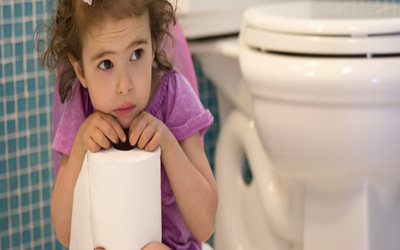Constipation is referred to passage of hard stools (poo). In constipation, child may pass poo fewer than 3 times a week, can have painful motion, not able to pass poo despite his best effort or may be passing poo in standing position.
[the_ad id=”13371″]
Why does my child get constipation?
Many diseases can cause constipation. However, most common cause (more than 90%) for constipation in children is functional constipation. Let your doctor decide the exact cause of constipation.If there is any treatable reason, then it can be addressed. Special children like with cerebral palsy get constipated easily and requires medicines more often.
How does the child get constipation?
Functional constipation is a habit and not a disease. Child’s poo pattern gradually changes to grown-up pattern in the second year of life and child needs to be trained for the same. When this pattern is not guided properly, child gets constipation. Most of the children do consider the act of passing poo is less important, keep themselves busy with play or television or smart phones and avoid passing poo. When poo gets stored in the large intestines for more than 24 hours, it becomes hard and then gets stuck. When child wishes to pass such hard poo, it has to put a lot effort. Besides this, hard stool hurts his bottom and child further avoids passing poo, making it harder and vicious cycle begins.
What makes poo hard?
Not drinking enough water, delaying passing stool, not eating enough healthy diet, eating food with less fibers, drinking too much milk etc.
How can I prevent constipation?
- Plenty of fluids. Drinking water is the best
- Decrease the milk in diet to twice daily
- Less junk food and good amount of fruits and vegetables
- Regular exercise
- Try massaging your child’s belly
- Good toilet habit from the second year of life
What is a good toilet habit?
- Make it comfortable. Don’t pressurize them
- Involve them in the entire process of potty training
- His/ her knees should be above the level of hip
- Indian sitting is best to practice
- Make it a routine- Make him spend regular 10 minutes daily at fixed timings
- Make it a fun- Avoid scolding him for not able to pass poo. Keep a reward system using points accumulated over a week to keep a track on improvement
What should I do if my child continues to have constipation despite above measures?
Consult your pediatrician. Your child needs a little help.
When are the medications necessary and which medicines should be given?
Medications are necessary when child is having painful poo and not getting better despite change in diet for 1 week. Takes doctors’ advice for medicines. There are many types of medicines; few are given through mouth and few from bottom.
- Laxatives- They are most common medicines used in children. When used in correct doses, they are very safe in children. Laxatives are used to soften the stool. Medicines should be given till body gains the habit of passing soft poo at least once a day without pain and sitting position. The duration of treatment required is in months and not in weeks. Stop medicines only when your doctor advises to do so.
- Stimulants- These medicines help the bowel to push the stool (poo) out. We generally avoid these in children.
- Lubricants- Paraffin based syrups causes lubrication for the stools and helps them to come out easily. If given in more quantity they can cause oil staining of knickers.
- Enemas/ suppositories- These medicines are given from bottom. They should be given only in emergencies and not on daily or as and when required. Most of the children do not like it.
What are the soiling accidents?
In severe constipation, poo becomes very hard and cannot be pushed down. Liquid stool (fresh poo) leaks around the hard poo and leaks out. This causes soiling. Many times children are not aware of this and do not report this to parents. Sometimes this can be even mistaken for loose stools. Take doctors’ help in such situation.
When should I consult the doctor immediately? (Danger signs to look for!)
- When the child has blood in the stool (poo)
- Child is having increased size of his tummy
- Child has vomiting and not eating enough
- Child is having extreme pain in tummy
- Child is not growing well

